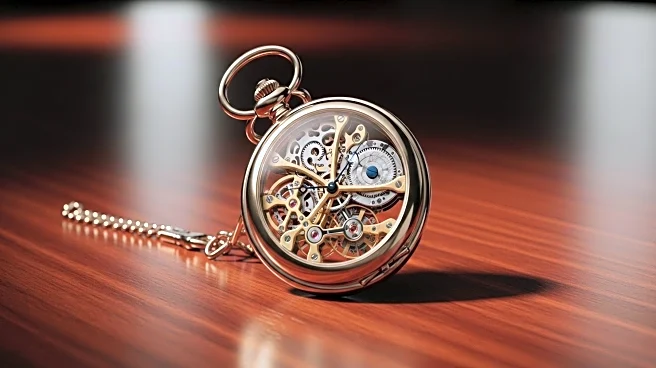What's Happening?
Ferdinand Berthoud, a brand acquired by Karl-Friedrich Scheufele, co-president of Chopard, has released a new book titled 'Ferdinand Berthoud: The Quest for Precision.' Published by Assouline, the book delves into the life and innovations of Ferdinand Berthoud, a pioneer in marine chronometry during the Age of Enlightenment. The book also explores Scheufele's revival of the Berthoud name through contemporary timepieces that honor Berthoud's legacy. The brand is known for producing approximately 100 COSC-certified watches annually, emphasizing true artisanal watchmaking. This is exemplified by the fusée-and-chain transmission system, which releases energy steadily, unlike the metal alloy hairsprings used in most mechanical watches today. The book also highlights the Naissance d’une Montre 3 project, a watch built entirely by hand, requiring 11,000 hours of manual labor, showcasing the brand's commitment to preserving endangered horological skills.
Why It's Important?
The release of 'The Quest for Precision' book underscores the significance of preserving traditional watchmaking techniques in an era dominated by automation and mass production. Ferdinand Berthoud's dedication to artisanal craftsmanship not only maintains historical horological skills but also sets a benchmark for quality and precision in the luxury watch industry. This approach appeals to collectors and enthusiasts who value the artistry and heritage behind each timepiece. The brand's success at the Grand Prix d’Horlogerie de Genève further solidifies its reputation, potentially influencing other watchmakers to prioritize craftsmanship over mechanization. The book serves as both a tribute to Berthoud's legacy and a testament to the enduring appeal of handcrafted luxury goods.
What's Next?
Ferdinand Berthoud's continued focus on artisanal watchmaking may inspire other luxury brands to revisit traditional methods, potentially leading to a resurgence in handcrafted products across the industry. The brand's commitment to preserving horological skills could also foster collaborations with educational institutions and foundations dedicated to training new generations of watchmakers. As the book gains traction, it may attract a broader audience interested in the history and craftsmanship of luxury watches, further enhancing the brand's prestige and market presence.
Beyond the Headlines
The emphasis on artisanal watchmaking by Ferdinand Berthoud raises questions about sustainability and the environmental impact of luxury goods production. By prioritizing manual labor and traditional techniques, the brand may contribute to reducing the carbon footprint associated with automated manufacturing processes. Additionally, the book's exploration of historical innovations in navigation and timekeeping could spark interest in the cultural and scientific contributions of horology, encouraging a deeper appreciation for the intersection of art and science in watchmaking.










